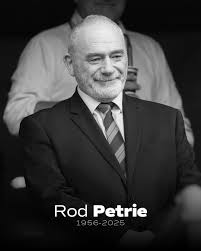
Introduction
Rod Petrie, a prominent figure in Scottish football, has played a pivotal role in shaping the landscape of the sport in Scotland over the last few decades. As the chairman of the Scottish Football Association (SFA), he has overseen numerous changes aimed at modernising the game and improving its governance. Petrie’s leadership has been particularly significant in recent years, with efforts to enhance youth development and the overall competitive stature of Scottish football on an international level.
Career Beginnings
Petrie’s involvement in football began at his early days at the University of Edinburgh, where he formed connections that would prove vital in his subsequent career. He joined Hibernian FC’s board in the late 1990s and quickly rose through the ranks, first becoming vice-chairman and subsequently chairman. His tenure at Hibernian saw the club achieve notable successes, including winning the Scottish League Cup in 2007.
Chairmanship at SFA
In 2016, Petrie was elected as the president of the SFA, marking a significant transition in his career. Under his leadership, the organisation has worked towards addressing various challenges facing the sport, including financial disparities and the need for improved training facilities across clubs in Scotland. Additionally, Petrie has been a strong advocate for integrating technology into the game, backing initiatives like VAR (Video Assistant Referee) to ensure fair play during matches.
Key Initiatives and Developments
One of Petrie’s notable initiatives has been the focus on youth football development. Recognising the importance of nurturing young talent, he has pushed for better resources and support for grassroots clubs, aiming to establish a more robust pipeline for future generations of Scottish footballers. This commitment is reflected in the long-term strategies laid out by the SFA, emphasising the importance of sustainable growth in Scottish football.
Furthermore, Petrie has been a vocal supporter of women’s football, advocating for increased visibility and investment in the women’s game. His leadership has coincided with a significant increase in interest and participation levels among women and girls in football, aligning with the broader aims of promoting equality in sports.
Conclusion
Rod Petrie’s contributions to Scottish football have not only shaped the present landscape but also laid the groundwork for its future. As he continues to advocate for progressive changes within the sport, the impact of his initiatives is expected to resonate for years to come. For Scottish football supporters, Petrie’s vision for a prosperous and equitable future remains a topic of great interest and speculation. With ongoing challenges, his experience and leadership will be crucial in navigating the footballing world as it evolves.
You may also like

The Evolving Role of the Manager in Modern Business

Boris Johnson: A Look at His Current Political Landscape
